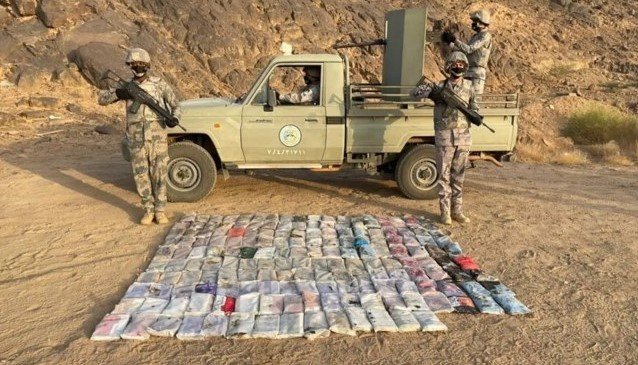Saudi authorities have detained 37 people linked to a major drug trafficking network operating in the Riyadh and Hail regions, including six government employees, in a rare and deeply embarrassing scandal for the Kingdom.
The arrests, announced by the Ministry of Interior, span a mix of nationalities and professions. Among those rounded up are individuals working for the defense, health, and interior ministries — raising serious questions about internal security and institutional complicity.
A Shock to the System
Nobody really saw this coming. Saudi Arabia has long prided itself on tough anti-drug laws and harsh penalties for smugglers and dealers. But this case hits close to home — too close, really.
The suspects include 28 Saudis, five Syrians, two Ethiopians, and two Yemenis. More than just numbers, the accused span a spectrum of society — from regular citizens to those working inside the very institutions tasked with protecting the country. That part hurts.

Authorities say the gang was trafficking amphetamines, methamphetamine (known locally as “shabu”), and controlled tablets often used as prescription medications.
And yes, six of the accused work for the government:
-
Two from the Ministry of Defense
-
Two from the Ministry of National Guard
-
One from the Ministry of Interior
-
One from the Ministry of Health
The Drug Route and What Was Moving
According to officials, the drugs being moved weren’t just any street-level narcotics. These were high-potency, high-demand substances with serious public health consequences. Amphetamines, especially, have become a growing concern in the Gulf.
Saudi police say they intercepted multiple batches of:
-
Amphetamine pills
-
“Shabu,” the local term for crystal meth
-
Prescription tablets requiring strict medical regulation
The drugs were reportedly brought in using complex hand-offs across regional routes, involving both citizens and foreigners. The suspected foreign accomplices are believed to have crossed borders illegally, exploiting gaps in remote stretches of the frontier.
It’s not just about selling drugs — it’s the networks behind them. And those networks are getting smarter.
The Government’s Embarrassing Involvement
This is where things get messy.
You expect crime syndicates to operate from the shadows, not from behind official ID cards and office desks. The involvement of ministry personnel — especially in defense and interior — has triggered a fresh wave of internal reviews.
One officer with ties to the case, speaking anonymously, said, “We’re dealing with betrayal here. This wasn’t just some street-level deal. Some of these guys had security clearances.”
The question now? How deep does it go?
Even as authorities downplay the possibility of broader institutional failure, there’s growing pressure for transparency. Because if people entrusted with weapons and security can’t be trusted, then what?
Public Reaction: Mixed Feelings and Big Questions
On social media, Saudis expressed a mix of disbelief, frustration, and — interestingly — some relief that the government at least made the arrests public.
“Imagine someone in uniform helping push meth to teenagers,” wrote one user on X (formerly Twitter). “Glad they got caught. But how long was it happening before?”
Others asked if this was just the tip of the iceberg, especially in a region where youth unemployment and mental health struggles are feeding a quiet demand for narcotics.
There’s also a small but vocal segment calling for rehabilitation, not just punishment. A few users urged the government to spend more on addiction services — saying arresting dealers doesn’t address the root problem.
The Pattern Is Bigger Than This Bust
Saudi Arabia isn’t alone in grappling with drug crimes involving public servants. But the regional context matters. Across the Gulf, synthetic drug trafficking has spiked in recent years, aided by smuggling routes from Syria, Lebanon, and Yemen.
According to the United Nations Office on Drugs and Crime (UNODC), the Gulf region has emerged as one of the most profitable markets for amphetamines in the world. Captagon — a cousin of the amphetamines found in this bust — has been flooding Gulf states via conflict zones in the Levant.
This table shows seizure trends in the region based on UNODC estimates:
| Year | Total Amphetamine Pills Seized in Saudi Arabia (Millions) | Notable Source Country |
|---|---|---|
| 2021 | 107 | Syria, Lebanon |
| 2022 | 73 | Syria, Iraq |
| 2023 | 88 | Yemen, Syria |
| 2024 | 94 | Lebanon, Jordan |
While this latest case involved locally organized actors, Saudi officials have routinely blamed cross-border flows for pushing drugs into the Kingdom. The latest bust now suggests that local networks may be growing more self-reliant — and bolder.
Legal Fallout and the Road Ahead
The Ministry of Interior said that all suspects were referred to the Public Prosecution. No trial dates have been announced yet, and legal proceedings are expected to unfold quietly, at least at first.
Behind the scenes, sources say there’s mounting pressure to make examples out of the accused — especially those wearing government uniforms.
One former prosecutor said flatly, “These aren’t going to be light sentences. The message has to be brutal.”
There’s also talk of internal ministry audits and “loyalty checks” being rolled out in some departments — particularly where employees hold security or medical roles. Quiet purges may already be underway.
And maybe, just maybe, this case ends up being a wake-up call.
